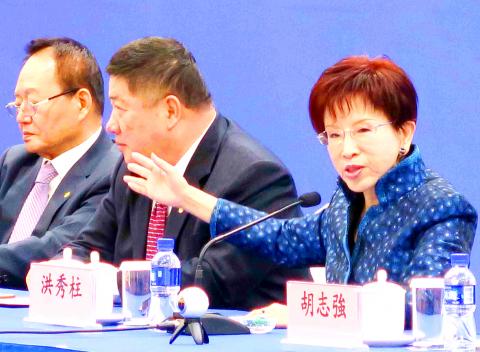The Chinese Nationalist Party’s (KMT) annual forum with the Chinese Communist Party (CCP) began yesterday in Beijing and a new panel — the political panel — was created to “explore possibilities for cross-strait political talks,” KMT Vice Chairman Steve Chan (詹啟賢) said.
At the opening ceremony, Chan said the forum has taken place since 2006 and during those years “the KMT had been in opposition, became the ruling party [in 2008] and has now again become the opposition.”
“Looking back on the 10-year history of the forum, we see that the resolutions made in the past have been adopted by the governments in each side of the Taiwan Strait and turned into policies that greatly benefited the people,” he said.

Photo: CNA
Chan said that government officials of both sides had participated in the forum over the past eight years to discuss possible policies, which was “a rare page in history.”
“That page has been brought to a temporary end and it is widely known that the cause is the denying of the ‘1992 consensus’ as a political foundation” by the Democratic Progressive Party government, he said.
As the two sides of the Taiwan Strait have experienced “more than 60 years of institutional, military and diplomatic differences, it takes time and wisdom to discuss fusing this half-century gap and that is why a new panel — the political panel — has been added to this year’s forum,” he said.
He said that while many Taiwanese political pundits have expressed doubts about holding this year’s forum, “the KMT knows that there cannot be a lack of communication across the Strait, as prosperity has only been possible in the past eight years after the KMT decided in 2005 [to hold talks with Beijing] after witnessing the cross-strait stalemate caused by [then-president] Chen Shui-bian’s (陳水扁) administration.”
This year’s forum includes five panels — political, economic, cultural, social and youth.
This year the “cross-strait economic, trade and cultural forum,” has been renamed the “cross-strait peaceful development forum.”
The change is believed to have been decided by KMT Chairwoman Hung Hsiu-chu (洪秀柱) to advance her “peace party platform,” which was passed by the party’s national congress in September and has since spawned controversy within the KMT as it calls for a peace agreement with China.
KMT Policy Committee executive director Alex Tsai (蔡正元) said that the party is not looking to replace the Straits Exchange Foundation, as it is an agency of public authority, the Chinese-language Apple Daily reported.
The KMT, working as a non-governmental organization, is constructing a KMT-CCP communication mechanism, which would not affect cross-strait dialogue at the official level, he added.
“The KMT’s and Hung’s goal is to reduce the negative effects and damage caused by [President] Tsai Ing-wen (蔡英文) to a minimum,” Alex Tsai said.

INVESTIGATION: The case is the latest instance of a DPP figure being implicated in an espionage network accused of allegedly leaking information to Chinese intelligence Democratic Progressive Party (DPP) member Ho Jen-chieh (何仁傑) was detained and held incommunicado yesterday on suspicion of spying for China during his tenure as assistant to then-minister of foreign affairs Joseph Wu (吳釗燮). The Taipei District Prosecutors’ Office said Ho was implicated during its investigation into alleged spying activities by former Presidential Office consultant Wu Shang-yu (吳尚雨). Prosecutors said there is reason to believe Ho breached the National Security Act (國家安全法) by leaking classified Ministry of Foreign Affairs information to Chinese intelligence. Following interrogation, prosecutors petitioned the Taipei District Court to detain Ho, citing concerns over potential collusion or tampering of evidence. The

NEGOTIATIONS: The US response to the countermeasures and plans Taiwan presented has been positive, including boosting procurement and investment, the president said Taiwan is included in the first group for trade negotiations with the US, President William Lai (賴清德) said yesterday, as he seeks to shield Taiwanese exporters from a 32 percent tariff. In Washington, US Trade Representative Jamieson Greer said in an interview on Fox News on Thursday that he would speak to his Taiwanese and Israeli counterparts yesterday about tariffs after holding a long discussion with the Vietnamese earlier. US President Donald Trump on Wednesday postponed punishing levies on multiple trade partners, including Taiwan, for three months after trillions of US dollars were wiped off global markets. He has maintained a 10 percent

TRADE: The premier pledged safeguards on ‘Made in Taiwan’ labeling, anti-dumping measures and stricter export controls to strengthen its position in trade talks Products labeled “made in Taiwan” must be genuinely made in Taiwan, Premier Cho Jung-tai (卓榮泰) said yesterday, vowing to enforce strict safeguards against “origin laundering” and initiate anti-dumping investigations to prevent China dumping its products in Taiwan. Cho made the remarks in a discussion session with representatives from industries in Kaohsiung. In response to the US government’s recent announcement of “reciprocal” tariffs on its trading partners, President William Lai (賴清德) and Cho last week began a series of consultations with industry leaders nationwide to gather feedback and address concerns. Taiwanese and US officials held a videoconference on Friday evening to discuss the

PERSONAL DATA: The implicated KMT members allegedly compiled their petitions by copying names from party lists without the consent of the people concerned Judicial authorities searched six locations yesterday and questioned six people, including one elderly Chinese Nationalist Party (KMT) member and five KMT Youth League associates, about alleged signature forgery and fraud relating to their recall efforts against two Democratic Progressive Party (DPP) legislators. After launching a probe into alleged signature forgery and related fraud in the KMT’s recall effort, prosecutors received a number of complaints, including about one petition that had 1,748 signatures of voters whose family members said they had already passed away, and also voters who said they did not approve the use of their name, Taipei Deputy Chief Prosecutor